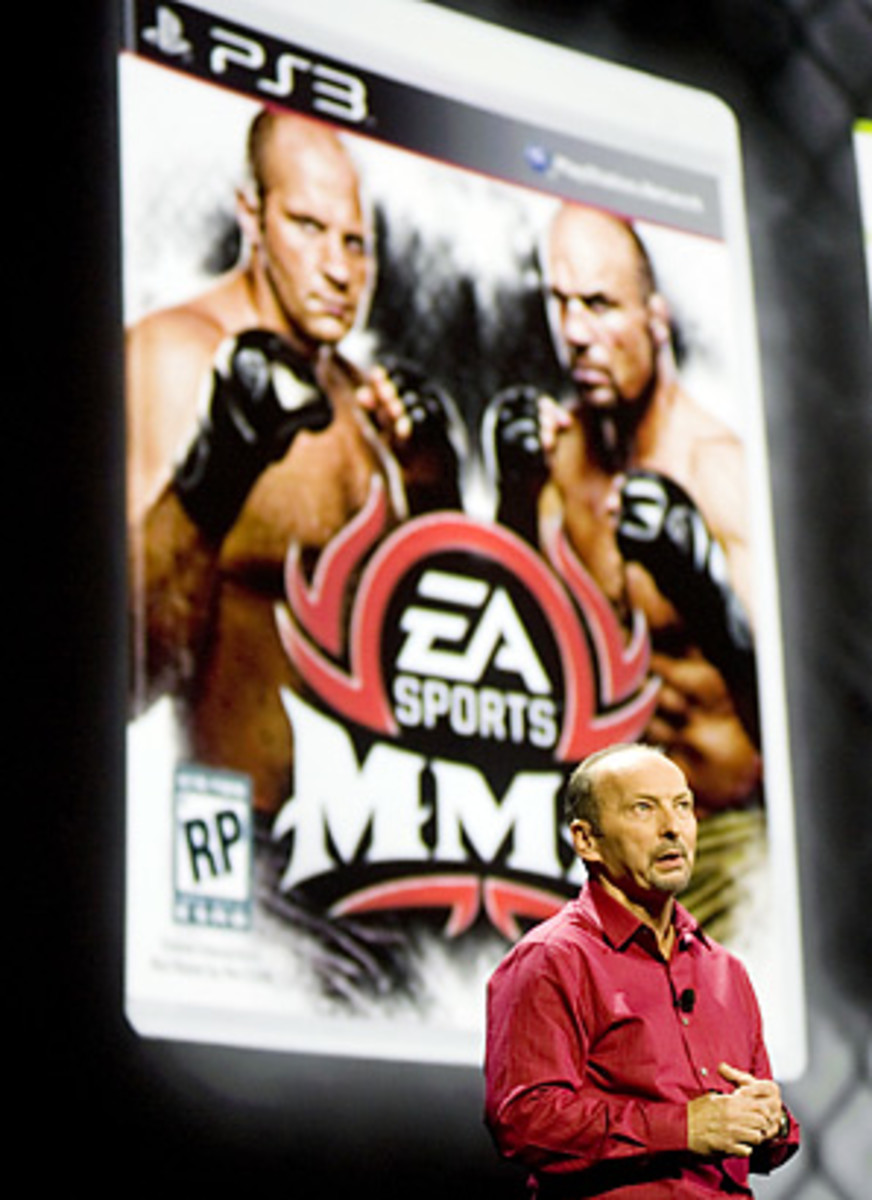MMA ongoing rivalry goes digital
LOS ANGELES -- When EA Sports suggested to Strikeforce CEO Scott Coker three months ago that it would like his mixed martial arts promotion to do "something big" at this year's Electronic Entertainment Expo -- an annual three-day exercise in sensory overload put on by the multi-billion-dollar video game industry for the purpose of showcasing its latest and greatest products -- he admittedly aimed too low.
"I originally thought we'd put some mats down at the E3 convention and let these guys roll around, do some autograph signings," Coker said Wednesday evening after an EA Sports-inspired Strikeforce card drew a near capacity crowd of 5,292 to the Nokia Theatre.
For Peter Moore, president of EA Sports, a night of MMA in conjunction with E3 represented an opportunity to give 120 retailers and 400 gaming media a better understanding of the strong support EA Sports MMA has from the top of the video game giant. Calling EA a "long-term investor in MMA," Moore's history in the sport harkens back a decade to his time as chief of Sega's American outfit, when a UFC-licensed game for the Dreamcast platform was one of his passion projects.
His decision to return to the MMA space minus the benefits of the powerful UFC brand, which now belong to video game producer THQ, has not gone unnoticed, most notably by UFC president Dana White, who believes EA is jumping in late because it thinks it can make a buck.
"I don't look back," Moore said. "I'm very committed to growing this sport through interactive entertainment. That's what we're doing. THQ, who are good friends of mine, have that license."
Prior to last summer's mega UFC 100 event, White laid down a now-meaningless decree that fighters who appeared in the EA title would be barred from competing in the UFC. The competing video games essentially represented a proxy war between Zuffa, MMA's most successful promoter, and Strikeforce, which is labeled as the "premier" fighting circuit in EA MMA and has established itself as No. 2 in North America.
"If you're sensing a rivalry it's more at the UFC level than THQ level," Moore said. "If what the UFC is saying is fueling passionate rivalry and competition and grows the sport, grows interest in the sport, and grows interest in buying video games in the sport, then I'm all for it."
It certainly didn't feel like a coincidence that the EA and THQ booths were within 30 feet of each other during this year's E3, especially because in 2009 they weren't.
So, can the market support two MMA games?
"From our standpoint we have the UFC brand; everything kind of starts there and ends there," said Arturo Castro, brand manager for THQ's UFC Undisputed, which sold a staggering 3.5 million units of the 2009 version. "If you ask EA why they didn't call their game the Strikeforce League they'll probably tell you it's not a big enough promotion. What brand is bigger: the UFC in fighting or EA in sports? I guess time will tell on that one."
It's an interesting question that could reveal how far the sport has advanced in the minds of casual viewers. Conventional wisdom holds that UFC is the only brand of MMA that matters. If this is true, EA Sports MMA, despite all the time and money invested in making a quality interactive gaming experience that picks up on much of the international flavor of the sport, could fall flat. As it is, THQ's quick followup release of Undisputed 2010 fell well short of expectations, raising concerns about whether or not an MMA game can function as a annual title.
"It's a new space," said Castro, whose product had the misfortune of being released against one of the most anticipated games of '10, Red Dead Redemption, which is very much like what The Karate Kid did to The A-Team last week. "There's never been a fighting game that's been an annual title. We'll see."
EA Sports plans on releasing new versions of its MMA title every other year.
"You shouldn't take too much into account on whether it's a negative trend for mixed martial arts in video games," Moore said of the UFC sequel's lagging numbers. "You should look at this for the next few months. This thing could sell all the way through the holidays. We're watching this situation very closely. ... Do I wish they probably had a better start? I think so. But I see things in the macro situation in the industry right now. They shipped in a tough window and right now their early numbers are paying the price a little bit."
By not being hitching its title to a particular promotion, Moore believes EA Sports MMA, which hits shelves Oct. 19, was able to "do a lot more things than you currently can do in the UFC game that THQ has licensed. They have taken a license and made a game out of it. We've taken a sport. We're going to globalize it. We're going to digitize it. We're going to deliver it all around the world. We have an ability to look at the sport in a broader way than, quite frankly, simply having a licensing agreement with obviously a powerful part of the sport, to their credit. But with that power comes some restrictions, approvals and inability to do things that having your own intellectual property, as we do in EA Sports MMA, allows us to do. We've learned that lesson over the years."
In the end, said Castro and Moore, it may be the consumer who wins out as competition spurs on innovation in gaming.






